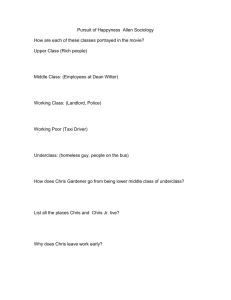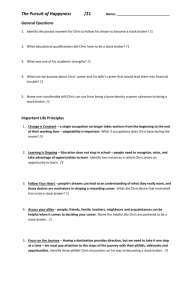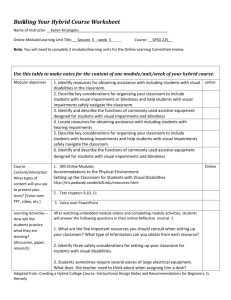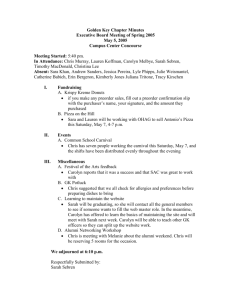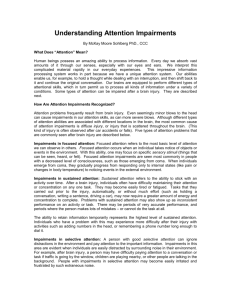Emotional Impairments
advertisement
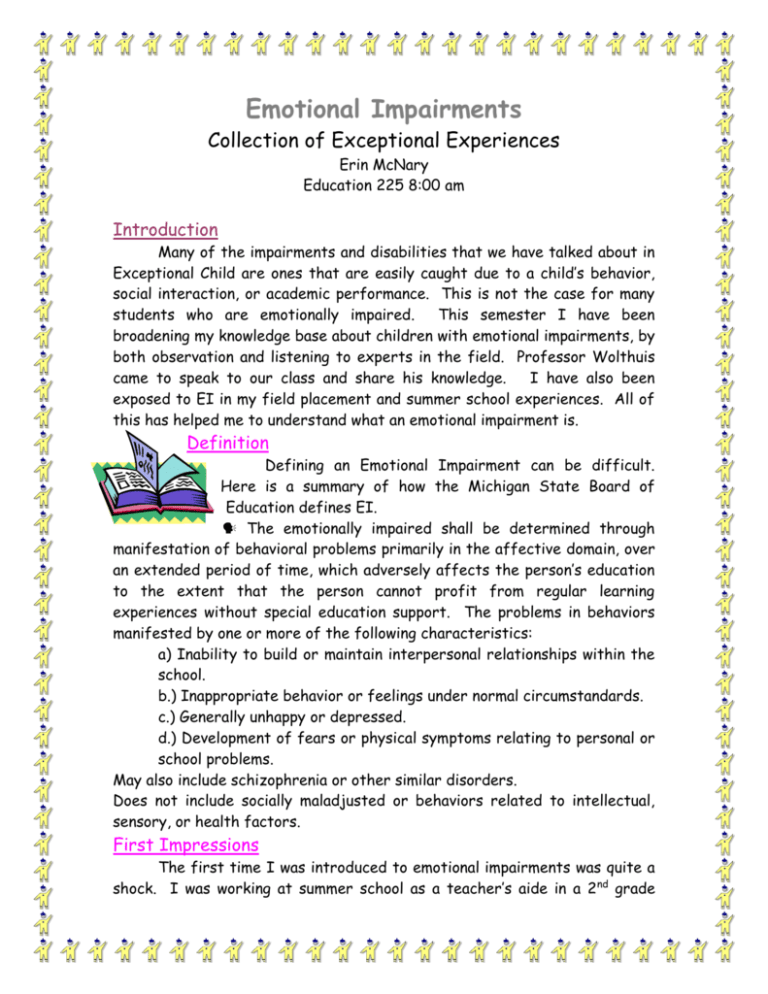
Emotional Impairments Collection of Exceptional Experiences Erin McNary Education 225 8:00 am Introduction Many of the impairments and disabilities that we have talked about in Exceptional Child are ones that are easily caught due to a child’s behavior, social interaction, or academic performance. This is not the case for many students who are emotionally impaired. This semester I have been broadening my knowledge base about children with emotional impairments, by both observation and listening to experts in the field. Professor Wolthuis came to speak to our class and share his knowledge. I have also been exposed to EI in my field placement and summer school experiences. All of this has helped me to understand what an emotional impairment is. Definition Defining an Emotional Impairment can be difficult. Here is a summary of how the Michigan State Board of Education defines EI. The emotionally impaired shall be determined through manifestation of behavioral problems primarily in the affective domain, over an extended period of time, which adversely affects the person’s education to the extent that the person cannot profit from regular learning experiences without special education support. The problems in behaviors manifested by one or more of the following characteristics: a) Inability to build or maintain interpersonal relationships within the school. b.) Inappropriate behavior or feelings under normal circumstandards. c.) Generally unhappy or depressed. d.) Development of fears or physical symptoms relating to personal or school problems. May also include schizophrenia or other similar disorders. Does not include socially maladjusted or behaviors related to intellectual, sensory, or health factors. First Impressions The first time I was introduced to emotional impairments was quite a shock. I was working at summer school as a teacher’s aide in a 2 nd grade classroom. In our little boy named Chris. old and still cried when dropped him off for the working with him one on would start crying if I to try an answer again. I classroom was a He was eight years his parents day. When I was one during math he told him he needed didn’t understand what was going on. None of the Imlay City Summer School other students had as much trouble as Chris did. His behavior was disruptive to the entire class. My first reaction to Chris was that of disgust. I didn’t feel it was fair that he controlled the mood of the class. It wasn’t until later that someone told me that Chris was EI. I spent the rest of the summer trying to read Chris’s moods and so that we would avoid his screeching cries. I now wish someone had told me how to properly deal with Chris, but I don’t believe many of the teachers knew what to do either. Having this experience has really made me want to be more prepared for the difficulties I may face. Professor Wolthuis Professor Wolthuis is one of Hope’s experts on emotional impairments. The day he came to talk with our class he showed “Cipher in the Snow”, a movie about a boy named Cliff Evans who has an emotional impairment. In this movie there is a young boy who doesn’t say much and isn’t well known in his school. One day he suddenly dies and no one knows why. Because this Cliff was not disruptive in school nobody bothered to pay him any attention. Watching this movie got across the point to me that not all EI students are like Chris. They won’t always verbalize their problems and that I need to be on the look out for students with emotional impairments. Something that has been emphasized over and over this semester is that teachers need to get to know their students on a personal level. This movie and Professor Wolthuis’s talk reinforced this idea again. If you would like to read more about “Cipher in the Snow” click on the link below. http://www.rrv.net/bflc/youth/cipher.html Assistive Technology If someone had asked me before taking this class if their was any technology available to promote the learning of students with an emotional disorder I would have said no way. That changed when we had class presentations. One of the groups talked about assistive technology and the different groups it can help. Christy, Jason, Kristin, and Susana gave us a handout with different suggestions for EI students. They were: Personal computers Motorized Legos Woodshop or other hands on classes These things can help a Kristi explaining different types of child feel like they can Assistive Technology. accomplish something and keeps them involved. Keeping a student with an emotional impairment engaged and interested like any other student is very important. When I read that interactive media is useful that made something about Chris make more sense. During a lesson Chris would hum the tune to his video games. At the time I thought it was terrible that he was allowed to play video games so much. Now I see that his being engaged kept his attention. Perhaps educators can use learn something from video games. Impact on Myself and Career This semester I have come a long way in understanding emotional impairments from where I was when I met Chris. But there is still so much I have to learn. It is my hope that I will try to come up with better ways to teach any students I have with emotional impairments and to understand that they are not just a behavior problem I have to deal with. I also want to know my students well enough that something like what happened in “Cipher in the Snow” won’t be a problem. I don’t want to forget about a student because they are too much of a bother or because they don’t speak up for their needs.

